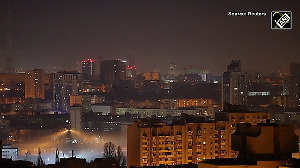Toughening its stand on the contentious infiltratation issue, the Kendrapara district administration in Orissa has imposed a 20-year domicile embargo on migrant Bengali-speaking people to attain eligibility for social security schemes.
Bengali-speaking settlers in Mahakalapada and Rajnagar blocks would now have to produce the proof to have settled in the areas for at least 20 years, official sources said on Tuesday.
Unless they corroborate 20-years nativity status, application of these linguistic groups will not merit consideration for government aided social security schemes.
The Centrally funded old-age pension, widow pension, disability pension besides public distrsibution system schemes would now be out of reach of Bengali speaking peoples living in these areas for less than two decades, they said.
We have already implemented 20-year nativity proof restriction in Mahakalpada and Rajnagar areas.
Bengali-speaking applicants who were found wanting were not considered for these schemes, said Kendrapara Collector Kashinath Sahu.
Block development officers of Mahakalpada and Rajnagar have been asked to ensure submission of nativity proof while sanctioning social security benefits to Bengali settlers.
As these areas are regarded as hubs of infiltration of Bangladeshis, we were forced to impose these restrictions.
The Bangla infiltrators are firmly ensconced under the garb of migrants from neighbouring West Bengal state, they said.
Migrant settlers from neighbouring states are lawfully entitled to settle here. They are also entitled to enjoy governmental benefits as per constitutional provisions.
There is little mechanism to diferentiate the migrant Bengalis and unlawful Bangla immigrants because of common spoken language of the both the groups, said Sahu.
All these measures are part of the exercise to curb illegal immigration from across Bangladesh, sources said.
In exercise of powers conferred by provisions of Foreigners Act, 1946, the Union Home Ministry had asked these Bangladeshis to quit the country's geographical boundary within 30 days of the service of Quit India notice on January 15, 2005, they said.
The quit notice had sparked off widespread protest both from the illegal settlers and political parties who vociferously claimed that bonafide citizens were wrongfully tagged as foreigners.
The exercise to deport them was later put on hold by the Centre and magisterial inquiry for nationality recheck had been ordered. But the move to deport them was kept on hold largely under political expediency.
The findings of magisterial inquiry are still kept under the wrap.
The governmental benefits that an Indian citizen is entitled to had been withdrawn in a phased manner from these foreign nationals strictly in conformity with legal provisions of the Foreigners Act, 1946.
The residential nativity certificates issued to them have been nullified and their names deleted from the voters list.
Ration cards issued to these families were also withdrawn.
Likewise subsidised ration supply to Bangladeshi nationals was discontinued. Fresh admission of Bangladeshi children was also stopped.






 © 2025
© 2025